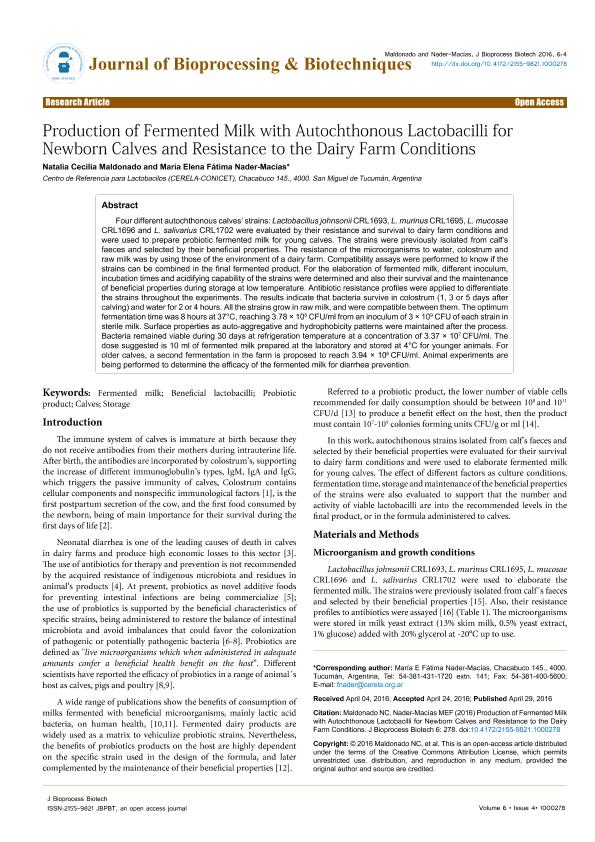Mostrar el registro sencillo del ítem
dc.contributor.author
Maldonado, Natalia Cecilia

dc.contributor.author
Nader, Maria Elena Fatima

dc.date.available
2018-09-10T18:32:26Z
dc.date.issued
2016-04-29
dc.identifier.citation
Maldonado, Natalia Cecilia; Nader, Maria Elena Fatima; Production of Fermented Milk with Autochthonous Lactobacilli for Newborn Calves and Resistance to the Dairy Farm Conditions; OMICS; Journal of Bioprocessing & Biotechniques; 6; 4; 29-4-2016; 1-5; 1000278
dc.identifier.issn
2155-9821
dc.identifier.uri
http://hdl.handle.net/11336/58950
dc.description.abstract
Four different autochthonous calves? strains: Lactobacillus johnsonii CRL1693, L. murinus CRL1695, L. mucosaeCRL1696 and L. salivarius CRL1702 were evaluated by their resistance and survival to dairy farm conditions andwere used to prepare probiotic fermented milk for young calves. The strains were previously isolated from calf?sfaeces and selected by their beneficial properties. The resistance of the microorganisms to water, colostrum andraw milk was by using those of the environment of a dairy farm. Compatibility assays were performed to know if thestrains can be combined in the final fermented product. For the elaboration of fermented milk, different inoculum,incubation times and acidifying capability of the strains were determined and also their survival and the maintenanceof beneficial properties during storage at low temperature. Antibiotic resistance profiles were applied to differentiatethe strains throughout the experiments. The results indicate that bacteria survive in colostrum (1, 3 or 5 days aftercalving) and water for 2 or 4 hours. All the strains grow in raw milk, and were compatible between them. The optimumfermentation time was 8 hours at 37°C, reaching 3.78 × 108 CFU/ml from an inoculum of 3 × 109 CFU of each strain insterile milk. Surface properties as auto-aggregative and hydrophobicity patterns were maintained after the process.Bacteria remained viable during 30 days at refrigeration temperature at a concentration of 3.37 × 107 CFU/ml. Thedose suggested is 10 ml of fermented milk prepared at the laboratory and stored at 4°C for younger animals. Forolder calves, a second fermentation in the farm is proposed to reach 3.94 × 106 CFU/ml. Animal experiments arebeing performed to determine the efficacy of the fermented milk for diarrhea prevention.
dc.format
application/pdf
dc.language.iso
eng
dc.publisher
OMICS
dc.rights
info:eu-repo/semantics/openAccess
dc.rights.uri
https://creativecommons.org/licenses/by-nc-sa/2.5/ar/
dc.subject
Fermented Milk
dc.subject
Beneficial Lactobacilli
dc.subject
Probiotic Product
dc.subject
Calves Storage
dc.subject.classification
Otras Ciencias Biológicas

dc.subject.classification
Ciencias Biológicas

dc.subject.classification
CIENCIAS NATURALES Y EXACTAS

dc.title
Production of Fermented Milk with Autochthonous Lactobacilli for Newborn Calves and Resistance to the Dairy Farm Conditions
dc.type
info:eu-repo/semantics/article
dc.type
info:ar-repo/semantics/artículo
dc.type
info:eu-repo/semantics/publishedVersion
dc.date.updated
2018-03-21T16:45:52Z
dc.journal.volume
6
dc.journal.number
4
dc.journal.pagination
1-5; 1000278
dc.journal.pais
Estados Unidos

dc.journal.ciudad
Los Angeles
dc.description.fil
Fil: Maldonado, Natalia Cecilia. Consejo Nacional de Investigaciones Científicas y Técnicas. Centro Científico Tecnológico Conicet - Tucuman. Centro de Referencia Para Lactobacilos; Argentina
dc.description.fil
Fil: Nader, Maria Elena Fatima. Consejo Nacional de Investigaciones Científicas y Técnicas. Centro Científico Tecnológico Conicet - Tucuman. Centro de Referencia Para Lactobacilos; Argentina
dc.journal.title
Journal of Bioprocessing & Biotechniques
dc.relation.alternativeid
info:eu-repo/semantics/altIdentifier/doi/http://dx.doi.org/10.4172/2155-9821.1000278
dc.relation.alternativeid
info:eu-repo/semantics/altIdentifier/url/https://www.omicsonline.org/open-access/production-of-fermented-milk-with-autochthonous-lactobacilli-fornewborn-calves-and-resistance-to-the-dairy-farm-conditions-2155-9821-1000278.php?aid=72624
Archivos asociados
